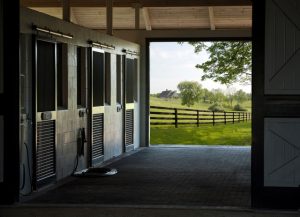Horizon Structures Presents Series: Difficult Horses. Difficult Boarders.
By Nikki Alvin-Smith
The development of a new horse boarding business often necessitates a major capital outlay for suitable stabling facilities. The notion that once a beautiful barn is built, the equine and human counterpart clients will exist in harmony under its roof is often more a fairy tale than reality.
There are many reasons that things take a wrong turn and life as a horse boarding barn manager becomes a nightmare. Difficult horses can make restless bedfellows for their compatriot equine residents with their persistent neighing, circling, rearing, or kicking habits. Cribbing or windsucking behavior from an individual equine can wreak havoc on the pristine new wood structure. It takes just one obnoxious horse owner to make daily life miserable for the staff and manager of the equestrian facility. The client that makes persistent phone calls and engages busy farm staff in longwinded chats full of unwanted and unwarranted advice on how their horse must be cared for is a routine nobody wants to endure.
To get ahead of these problems and others like them there are some surprisingly simple methods that can be employed to minimize and mitigate the risk of negative issues arising at the boarding barn.
Clever Barn Design Tricks and Tips
Smart design of the horse barn can help defray points of contention during daily horse care. Here are a few key considerations to bear in mind during the planning of your new barn project:
- Add extra points of access to the center aisle barn midway along the long side as well as at gable ends of the building. This will minimize the need for horses to be led past each other for turnout or riding and provides the added bonus of being able to work in the aisleway mucking stalls or cleaning up without blocking use of the entire barn.
- Avoid crossties in aisleways. A grooming/bath stall placed either centrally or at the end of the barn allows owners to go directly from tacking and grooming to outside riding and back again without constant walking back and forth in the aisle disturbing horses at rest.
- Place tack rooms close to grooming stalls. Keep ‘in house’ lesson tack and equipment in a separate space to boarders’ storage areas. Add a heavy-duty combo lock to the tack rooms and automatic closure to the doors so the tack rooms cannot be inadvertently left open. Provide all boarders with a lockable tack box or storage unit so they can secure their belongings.
- Make dividing stall walls of solid lumber rather than grilled halfway up, high enough to deter horses from being able to sniff nose to nose over the top board and sturdy enough to withstand kicking with adequate kick walls.
- Keep supplies such as hay/bedding under lock and key if possible in a separate storage structure.
- Build a secondary smaller barn that can be used for quarantine purposes or to house horses that are bad actors.
- Offer more than one style of horse keeping method by having more than one barn. For example, a barn with Dutch doors to the exterior and a ‘calving’ style paddock or lanai may work well for retiree horses or rehab purposes while a high-strung performance horse may do better with a standard stall and daily handling and turnout in a larger paddock or treadmill/hot walker for exercise.
- Have a gated entrance to the property that can be secured with a passcode if necessary to avoid unwanted visitors after regular business hours.
- Offer training services for clients’ horses that require behavioral management to improve the horse’s understanding of how to behave in a safe manner and similarly offer to train the client if necessary. Consistency in horse handling techniques is essential for a successful outcome in any training endeavor.
Make Good Rules And Enforce Them
The method a horse boarding barn is managed varies greatly across the industry. Rough board, partial board or full board can make the business challenging to manage when all offered in one facility. For example, if the barn rules and terms and conditions of leasing a stall at the barn state that the barn management will be responsible for all turnout schedules and horse handling back and forth to pastures, executing deworming and fecal worm count procedures, it is not helpful to have one or two ‘rough’ boarders coming and going as they please and not subject to the same rules for their horses’ care.
Whatever the rules of the barn keep them as succinct and simple as possible, so they are not subject to misinterpretation. Post the rules in a prominent place and add a final note to the rule chart stating what the penalty could be for infractions. Try to make the last line humorous if you can but make your point clear.
The single most important thing to do is enforce the rules. Don’t let one person slide because you like them better than another or treat one person’s horse with more regard than another because it is easier to deal with. Keep everything equitable to avoid upset.
Establish good routines for horses in your care and stick to them. A number one complaint among horse boarding clientele is that everything starts out well when they arrive and they are satisfied with the care their animal is provided, but that after a few months the standard of care declines or becomes sloppy. The honeymoon period is a good time to get to know each other as client and service provider but as the proverb warns, “Don’t let familiarity breed contempt.”
Train Your Client To Communicate Your Way
Determine in advance of starting up your horse business how you want to manage communications between you, your staff, and the clientele. Social media may be fine for posting advance notice of events or shows, but it is not the best method for day-to-day communication with your clients.
If possible have a ‘work’ cell phone for business use and keep your personal cell number private. Similarly have a work email rather than a generic ‘all use’ email that requires sieving through for spam. Once the work lines of communication are active check them regularly and respond promptly.
If a client is being too ‘needy,’ gently explain to them that you are doing your best, accommodate their needs where you can and if it is appropriate. Remember feedback is often a valuable method of improving your business model. But if the ‘needs’ become onerous or are unrealistic politely relay that fact to the client and let them go elsewhere without fuss rather than tolerate incessant complaints.
Management Training
Training horses may come naturally to you but managing people can require a different set of skills including a good measure of tact.
It is a good idea to ‘train yourself’ by taking a management course. When you learn and employ effective techniques to communicate with staff and clients, life will magically become easier. Most people do not have innate people management skills and avoiding the steep learning curve is simple to do with further education.
About Horizon Structures: One horse or twenty, there’s one thing all horse owners have in common…the need to provide safe and secure shelter for their equine partners. At Horizon Structures, we combine expert craftsmanship, top-of-the-line materials and smart “horse-friendly” design to create a full line of sheds and barns that any horse owner can feel confident is the right choice for their horses’ stabling needs.
All wood. Amish Made. Most of our buildings are shipped 100% pre-built and ready for same-day use. Larger barns are a modular construction and can be ready for your horses in less than a week. All our barn packages include everything you need –
Horizon Structures also sells chicken coops, equine hay feeders, greenhouses, dog kennels, 1 and 2 car garages, storage sheds and outdoor living structures and playsets.
Headquartered in South-Central Pennsylvania, Horizon Structures, LLC is owned by Dave Zook. Dave was raised in the Amish tradition and grew up working in the family-owned shed business. He started Horizon Structures in 2001 in response to an ever-increasing customer demand for high quality, affordable horse barns.
For additional information about the company or their product line, please visit their website at https://www.horizonstructures.com












